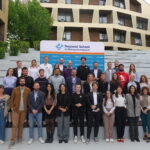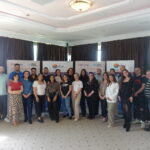The Feasibility of Cooperation Model: Employment of Roma Returnees – Towards Responsibility and Development
Conference under the name «The Feasibility of Cooperation Model: Employment of Roma Returnees – Towards Responsibility and Development» took place on Tuesday, March 7th, 2017, at the premises of UN House in Belgrade, under the auspices of the project “Support to Reintegration of Roma Returnees”, which is being implemented by the United nations Development Programme in Serbia, in cooperation with the Belgrade Fund for Political Excellence (BFPE) and the Standing Conference of Roma Associations of Citizens – The League of Roma (SKRUG). Project has been initiated in the mid 2016, and continues to deliver results in the field of employment and housing of Roma returnees well into the 2017. Partner organizations felt that it was time to open project results and findings to the wider audience and alert the public in Serbia with the scope of the difficulties Roma returnees are facing in Serbia in the last few years, especially since the breakout of the migrant crisis. Consequently, main goals of the conference were to present current results achieved on the project, and to present the entire underlying idea behind the project as an example of good practice for the immediate aid as well as further integration of Roma returnees. On the other hand, the conference aimed at alarming the decision-makers, relevant stakeholders and wider public to the issues of Roma returnees in Serbia.
Steliana Nedera, Deputy Permanent Representative of the UN in Serbia, pointed out that the intention of UNDP and its partners is to promote successful and sustainable reintegration of Roma returnees through innovative approach of the model of cooperation. This model is an example of establishing partnerships with various levels of government, local self-governments and communities, as well as with civil society organizations and international organizations, and perhaps most importantly, establishing partnership with the private sector.
Tanja Miscevic, Head of Serbia’s negotiating team for accession negotiations with the EU stressed that the issue of returnees and their reintegration is, at the same time, a matter of great importance for the negotiation process, and that this process contributes to solving problems in this area in several ways – through the implementation of the Action Plan based on the Strategy for Roma inclusion, placing the issue of Roma inclusion in the broader context of negotiations under chapters 23 and 24, as well as raising awareness about improving the position of Roma in Serbia in general.
Nenad Ivanisevic, State Secretary in the Ministry of Labor, Employment, Veteran and Social Affairs pointed out that, during the last week, the Government adopted a decision to establish a Coordination Body for Implementation of the Strategy for Roma Inclusion. He stressed the importance of education for Roma, as well as the importance of establishing the link between adequate access to education and the labor market of all Roma.
Miroslav Miletic, Vice President of the Serbian Chamber followed up on the Secretary of State’s remarks, noting that the list of the National Employment Service includes 26.000 Roma, while there is a possibility that the majority of them are not even included in the records. He added that Roma women are at a considerable disadvantage, and that we are facing a lack of an enabling environment for the development of Roma entrepreneurship.
Sonja Licht, President of the Belgrade Fund for Political Excellence stressed that despite the current popularity of the term of inclusion, it is necessary to talk about the true integration of all citizens of the Republic of Serbia. She noted that in order to convince others that Roma are equal, it is necessary that they are given the opportunity to participate in the most important social and political processes. The model that was presented at the conference should become a way of life, concluded Licht.













